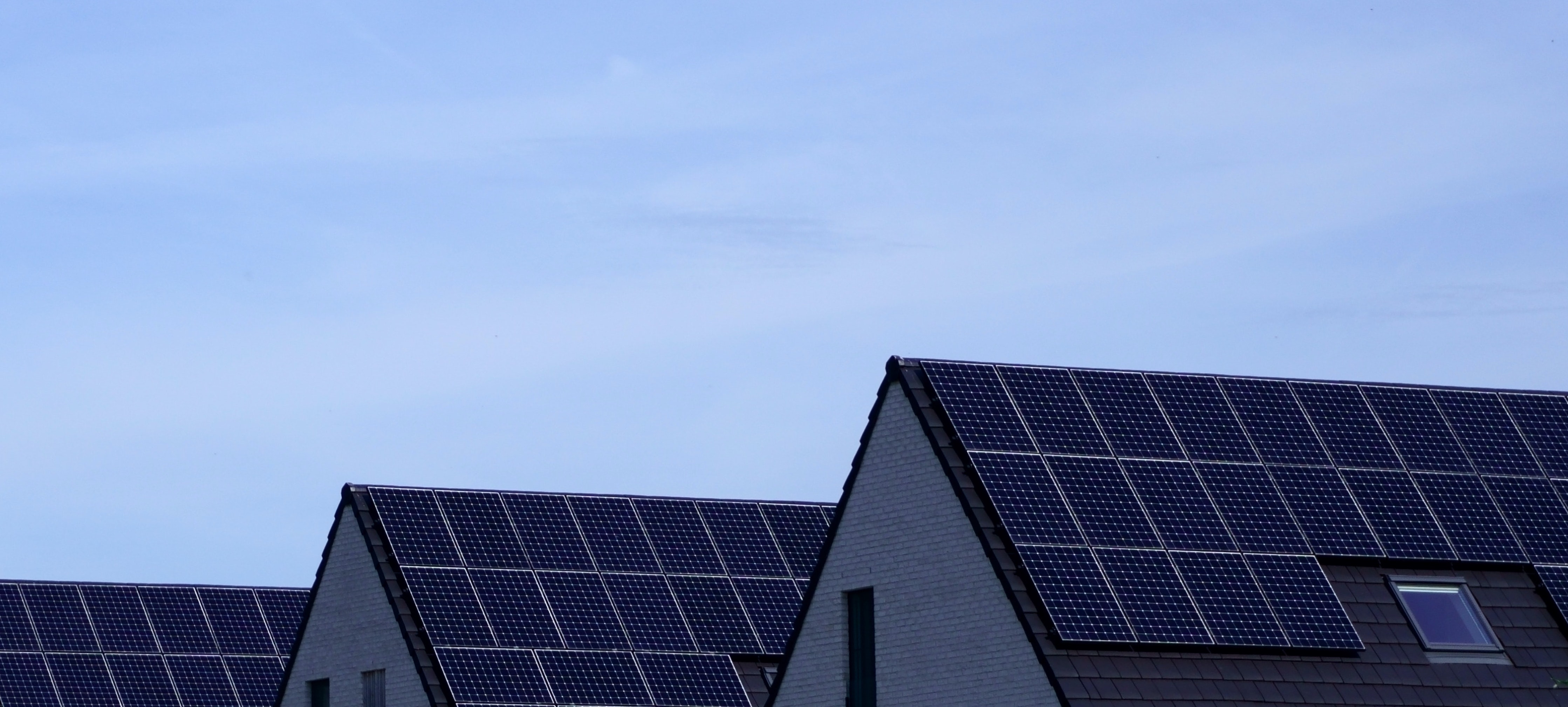Energy Renovation
Improving Energy Efficiency: The Right Way To Modernize A Property

Written by: Josephine Nguyen
Fit for the future?
Climate change, rising electricity and gas prices, inflation ... It's hardly surprising that, especially now, people are thinking about how to protect themselves from rising energy costs in the future. The trajectory set by the German government is clear: by 2030, a whopping 80 percent is to be generated from renewable energy sources and 60 percent less CO₂ consumed. In the coalition agreement, the government decided that photovoltaic systems would be mandatory on commercial roofs and the norm on private roofs. There are now also laws in some German states, such as Hamburg, Berlin, and Baden-Württemberg, which have introduced mandatory solar for new buildings and renovations gradually or plan to do so over the next few years. For property owners, this means that more energy-efficient renovations and modernizations are needed. But how do owners go about it? Is it worth it? And how do you apply for a loan? We'll explain it to you.
- Disambiguation
- Obligatory?
- Benefits
- Approach
- Loan
- Mistakes
- Noticeable Differences
- Market Situation
What Exactly Qualifies As A Modernization?
To avoid confusion, let's first clarify the difference between renovations and modernizations. When you hear the term renovation, it's about remedying a defect or damage, i.e., a deficiency, through extensive repairs. The goal is more of a restoration than a quality improvement. Typical renovation measures are, for example:
Mold removal
Facade repairs
Energy renovations
Balcony and terrace renovations
A modernization, on the other hand, can be seen as an upgrade or a goodie, which increases the living comfort and/or makes a building more energy-efficient, i.e., something like:
New water-efficient toilet cisterns or faucets
New ventilation systems
Elevator installations
New heating systems, e.g., with heat pumps
Installation of solar energy systems
Improved insulation, roofs or windows
Modernization loans are typically nothing more than earmarked installment loans (up to 50,000 euros) or construction financing (over 50,000 euros). They are directly linked to your property and are only paid out when you can prove that the planned measures have been implemented.
Are Owners Obligated To Modernize and Renovate?
Yes and no. Generally speaking, German law does not require you to update or renovate. So you don't have to redo a bathroom or kitchen every couple of years or anything like that. But there are some cases in which there are certain renovation regulations, for example, when:
the roof of your purchased or inherited house does not comply with the minimum thermal insulation (applies if you became the owner of a building existing at the time after February 1, 2002) and you do not live in it yourself. The roof must be insulated following the minimum requirements.
the heating system is over 30 years old, and you do not live in the building yourself. Then the heating pipes may need to be insulated, and the boiler replaced if they do not meet the standard.
you renovate at least 10% of the exterior facade. There are specifications on how it must be insulated if you already plan to tackle this.
the health of the occupants is at risk, e.g., in the case of mold infestation, dry rot, or water damage.
Why Is Modernizing Worth It?
Okay, so it's not a must to modernize your property. But there are some excellent reasons why it can make sense to spend a little money on these projects.
Reason 1: You Save Money In the Long Run
When you renovate or modernize a property, you have an initial investment, but in the long run, you can also significantly reduce your utility and operating costs. New insulation, modern heating, or new windows with triple glazing can ensure that you or your tenants have to heat much less. By installing and using a photovoltaic system or battery storage — which you can either use yourself or fully feed into the power grid — you reduce or offset electricity costs. And water-saving fixtures will also make future bills cheaper.
If you use the property yourself, you can deduct 20 percent of the modernization costs, up to a maximum of 40,000 euros, spread over three years. Speaking of saving money: There are attractive development loans from the KfW with excellent conditions for many modernizations and energy-efficient renovations. So your investment will pay off relatively quickly. You can find out more about subsidized loans under "Planning a modernization.“
Reason 2: You Future-Proof Your Investment
You know when they say it's always good to be prepared? This also applies to real estate. You'll be better off in the long run if you take care of things before they become problems and you have to carry out extensive renovations. If you're unlucky, you may be in for a nasty surprise sooner or later, which can get expensive. By modernizing, your costs are much easier to plan.
But modernization is also a good idea if you want to develop rental income as part of your investment strategy. According to the German Civil Code (BGB), the rent increase may amount to up to 8% of the modernization costs falling on the apartment each year (we explain more in detail below under the item "Planning a modernization.“) Since modernizations are also beneficial for tenants, they are usually well accepted. Nevertheless, you should proceed correctly and fairly. Otherwise, your tenants may object to the rent increase.
Modernizations also increase property value. So if you ever want to sell, that's another plus.
Reason 3: You're helping to protect the environment and improve sustainability
If you're one of the many people concerned about climate change and looking for ways to get involved, an energy modernization or renovation is a great approach. After all, you can significantly reduce the CO₂ emissions of your house or apartment and thus pave the way to climate neutrality. Germany aims to reduce emissions by 65 percent by 2030 and be climate neutral by 2045. According to a study by McMakler, however, we are still far from achieving this goal. So far, only 13 percent of all energy certificates issued for German properties have an energy rating of B or better. So there's definitely still room for improvement.
How Do You Plan A Modernization?
If you want to carry out an energy modernization or renovation, you can apply for a state subsidy, aka a KfW loan, as briefly mentioned above. The KfW offers various subsidized loans for existing properties and new buildings. However, you can't do this alone, but only directly via a bank or indirectly via a mortgage broker like us. Our financial professionals will find the right bank for your modernization loan and apply for the corresponding KfW funding.
Before you apply for the loan and start the refurbishment or modernization, we recommend hiring an energy efficiency expert. This person will take stock of the situation, tell you which measures are recommended, and draw up a corresponding concept with a renovation roadmap for your property. After implementing the modernization measures, you will need this person anyway to obtain the "confirmation after implementation" and to receive the repayment subsidy.
Note
If you have a condo in an apartment building, you can carry out all modernizations that affect your individual property without the consent of others. You also bear the costs yourself. However, if it concerns the common property (exterior facade, windows, roof, etc.), your HOA must agree, and the costs must also be borne proportionally by all.
Then you need the financing, subsidy application, and a contractor to carry out the renovation or modernization work. However, you shouldn't officially commission the company until you've successfully applied for financing and funding. Otherwise, you won't receive it. However, you can already obtain cost estimates to gauge the required loan amount.
At least three months before the start of construction work, you must inform your tenants in writing about the upcoming work and any rent increase. Your letter must contain the following:
Start of construction work
Duration of the works
List of planned measures
Amount of future operating costs
If applicable, new rent amount
However, you may only increase the rent if you haven't agreed on a graduated or index-linked rent or if you're legally required to. Otherwise, you're obligated to bear the costs yourself. Here are a few tips to calculate the maximum rent increase:
You have to deduct the maintenance costs that the modernization eliminated. This means costs that you would otherwise have had to spend on renovating.
You must also subtract public subsidies and interest savings from the modernization costs.
The rent increase may not exceed 8% of the remaining amount per year.
The rent increase may only increase by a maximum of 3 euros per square meter every six years. So if the 8% is above that, that's your cap.
If you feel unsure about calculating the new rent amount, you are welcome to contact our financial experts. We will be happy to work it out with you.
Once everything has been settled with your tenants, the change can be carried out as scheduled. If you are a skilled craftsman and can professionally perform the modernization work, you can do it yourself and save some of the modernization costs.
Once the work has been completed and the expert has given the official go-ahead, you'll be credited with your repayment subsidy.
Get Your Modernization Loan With Ease
So, if you need a modernization loan, Urbyo is the right place for you. During the consultation with your financial expert, you'll find out how high your maximum loan can be and which subsidy loans you can apply for. In addition, your contact will help you prepare and submit all the documents the bank requires. These include documents about your financial situation, cost estimates, and information about the property.
Don't worry: We'll find a suitable financing model for you and make the modernization process go as smoothly as possible. Your property will be fit for the future in no time.
Avoid Fails During Energy-Efficient Refurbishment
Poor planning: Uncoordinated implementation of refurbishment measures without taking into account their impact on the overall concept can lead to damage and subsequent costs.
Window replacement: New windows can improve thermal insulation, but if the entire building is not well insulated, thermal bridges can occur. Replacement can also lead to moisture damage.
Professional implementation: DIY (Do it Yourself) windows can lead to structural damage. A specialist company takes insulation and details into account to avoid moisture damage.
Photovoltaics for roof renovations: When renovating roofs, the integration of photovoltaics should also be considered in order to save costs and ensure efficient planning.
Efficiency of the heating system: Switching to a modern heating system, e.g. a heat pump, is pleasing, but the efficiency depends on the insulation and the heat distribution system.
Clarify before buying: When buying a house, you should clarify any renovation measures that have already been carried out, the dimensions of the heating system and the quality of the insulation.
Realistic expectations: The financial benefits of energy-efficient refurbishment only become apparent after a few years, and the choice of high-quality materials may be questionable if you intend to sell.
Price Development: Renovated vs. Unrenovated
Purchase prices for unrenovated residential buildings are generally lower than for renovated ones. However, in recent years, the price discounts for unrenovated properties — in terms of their energy efficiency — have remained relatively stable. Renovated properties continue to command higher prices overall, as their better energy performance and lower ongoing costs make them more attractive to buyers.
According to a study by JLL, the average price discount for multi-family buildings in energy efficiency classes B to G/H compared to the best classes A/A+ was 16.7 percent in the first quarter of 2024, down slightly from 17.2 percent in the previous quarter. This suggests a modest stabilization in price differences for less energy-efficient — and thus typically unrenovated — properties.
Regional Differences in Price Trends
There are significant regional differences in price development between renovated and unrenovated residential buildings. In urban areas with high housing demand, the price discounts for unrenovated buildings are smaller than in more rural regions. In the countryside, lower income potential and disproportionately high renovation costs can have a stronger impact on property values.
Future Market Developments
Renovated properties are expected to continue seeing strong demand, particularly due to the growing importance of energy efficiency and sustainability. Unrenovated properties, on the other hand, may remain under pressure — especially if construction costs stay stable or continue to rise.
Risks When Buying Unrenovated Properties
When purchasing unrenovated properties, buyers should not underestimate the potentially high costs and time required for necessary renovations. There is also a risk of unexpected financial burdens due to hidden construction defects or changes in regulations related to energy efficiency and environmental protection.
Returns: Renovated vs. Unrenovated
Renovated properties generally offer more stable and potentially higher returns, as they incur lower maintenance costs and can generate higher rental income. Unrenovated properties may provide higher initial yields but come with greater risks and uncertainties regarding future expenses.
Assessment by Financial Institutions
Financial institutions often view renovated properties more favorably, as they are considered less risky. Unrenovated properties may be subject to higher interest rates or stricter lending terms, especially when banks factor in the additional renovation costs in their risk assessments.
Role of Infrastructure and Micro-Location
Micro-location and infrastructure play a crucial role in determining property prices. Even a renovated building in a poor location may fetch a lower price than an unrenovated one in a prime area. However, renovated properties in desirable locations tend to achieve particularly high prices.
Buyer Groups: Owner-Occupiers vs. Investors
Owner-occupiers often prefer renovated properties since they are move-in ready and require no additional investment. Investors, on the other hand, may see opportunities in unrenovated properties — especially if they have the resources and expertise to renovate and resell or rent them at a profit. Some owner-occupiers with limited budgets may also choose to buy unrenovated properties and plan renovations themselves.
Future Trends and Environmental Policy
The trend toward sustainable living and stricter energy regulations is expected to continue. This will likely further boost demand for renovated properties, especially in markets where buyers and investors place increasing value on energy efficiency and environmental sustainability. Governments may also introduce new incentives or expand existing subsidies to promote building renovations — further reshaping the dynamics between unrenovated and renovated properties.
Market Situation
The renovation of properties remains a central issue in the German real estate market, especially in light of climate goals and rising energy costs. Despite initial signs of recovery in transaction volumes, a clear market trend has emerged: an increasing number of unrenovated existing properties are being listed for sale.
One key reason is that many older property owners are no longer willing to make long-term investments. At the same time, reduced government subsidies and complex application procedures are dampening the willingness to undertake renovations.
For buyers, such properties can present opportunities — but they require careful calculation of renovation costs. Those who plan wisely and take advantage of available incentive programs can still benefit from the potential of these properties despite the challenges.
In the long term, however, stronger political incentives and a simplification of funding structures will be necessary to make the housing stock more sustainable and energy-efficient.







